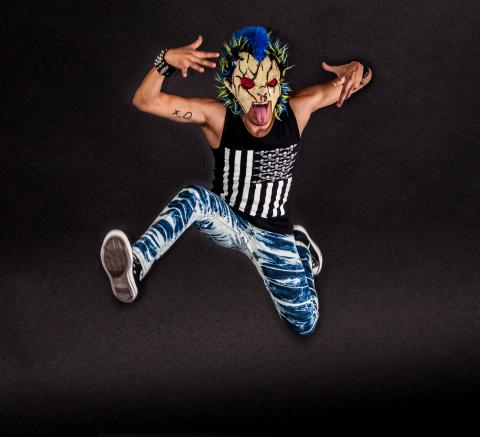In 2010, DJ BL3ND (real name withheld) started making videos and posting them to YouTube. At first, no one paid any attention to the teenager jumping around his room to hardcore electronic music. Then, at his parents’ insistence, he put on a mask that looked like a combination of Halloween’s Michael Meyers stitched together with Chuckie from Child’s Play and a 1980s glam rocker.
BL3ND danced hyperactively around his room in the mask to hard beats, but this time, something struck a chord, especially for rebelling teens. Soon, his viral YouTube videos had millions of hits and BL3ND was an in-demand DJ charging outrageous fees and traveling the globe. DJ BL3ND will be performing at ATT Show Box tonight.
“I never intended to be a mysterious person behind a mask,” BL3ND said in an e-mail interview with the Taipei Times.

Photo courtesy of DJ BL3ND
Now that he is known for his many different masks, BL3ND refuses to take them off. “I can express myself better with the mask on. Without a mask I’m just a normal person who you wouldn’t expect to be crazy,” he said.
Even though BL3ND has millions of fans on Facebook and across the globe, he claims he is a normal guy who likes to spend time with his family, dogs and friends when not listening to rock, hip-hop, old school jams and electronic music.
Like DJ Steve Aoki, who mixes two songs together and then hypes up the crowds by spraying champagne or throwing cake at them, DJ BL3ND makes sure that audiences get their money’s worth when they come to his shows by giving them his all. This means sometimes jumping out onto the crowd.
“Yes, I’ve gotten injured before. Not by crowd surfing, but by slipping on water and falling on a bass bottom at a show,” BL3ND said. “I ran back to the stage like nothing had happened, but I was actually just holding on to the pain.”
While BL3ND believes that image and music are both equally important, he knows deep down that anyone can be a viral video or two away from stardom. To the people who want to break into the DJ industry, his advice is: “Push a little harder to things you wouldn’t normally do.”
■ BL3ND performs tonight from 9:30pm to 4am at ATT Show Box, 7F, 12 Songshou Rd, Taipei City (台北市松壽路12號7樓). Tickets can be purchased at the door or iBon/FamiPorts for NT$2,000.

Jan. 5 to Jan. 11 Of the more than 3,000km of sugar railway that once criss-crossed central and southern Taiwan, just 16.1km remain in operation today. By the time Dafydd Fell began photographing the network in earnest in 1994, it was already well past its heyday. The system had been significantly cut back, leaving behind abandoned stations, rusting rolling stock and crumbling facilities. This reduction continued during the five years of his documentation, adding urgency to his task. As passenger services had already ceased by then, Fell had to wait for the sugarcane harvest season each year, which typically ran from

It’s a good thing that 2025 is over. Yes, I fully expect we will look back on the year with nostalgia, once we have experienced this year and 2027. Traditionally at New Years much discourse is devoted to discussing what happened the previous year. Let’s have a look at what didn’t happen. Many bad things did not happen. The People’s Republic of China (PRC) did not attack Taiwan. We didn’t have a massive, destructive earthquake or drought. We didn’t have a major human pandemic. No widespread unemployment or other destructive social events. Nothing serious was done about Taiwan’s swelling birth rate catastrophe.

Words of the Year are not just interesting, they are telling. They are language and attitude barometers that measure what a country sees as important. The trending vocabulary around AI last year reveals a stark divergence in what each society notices and responds to the technological shift. For the Anglosphere it’s fatigue. For China it’s ambition. For Taiwan, it’s pragmatic vigilance. In Taiwan’s annual “representative character” vote, “recall” (罷) took the top spot with over 15,000 votes, followed closely by “scam” (詐). While “recall” speaks to the island’s partisan deadlock — a year defined by legislative recall campaigns and a public exhausted

In the 2010s, the Communist Party of China (CCP) began cracking down on Christian churches. Media reports said at the time that various versions of Protestant Christianity were likely the fastest growing religions in the People’s Republic of China (PRC). The crackdown was part of a campaign that in turn was part of a larger movement to bring religion under party control. For the Protestant churches, “the government’s aim has been to force all churches into the state-controlled organization,” according to a 2023 article in Christianity Today. That piece was centered on Wang Yi (王怡), the fiery, charismatic pastor of the